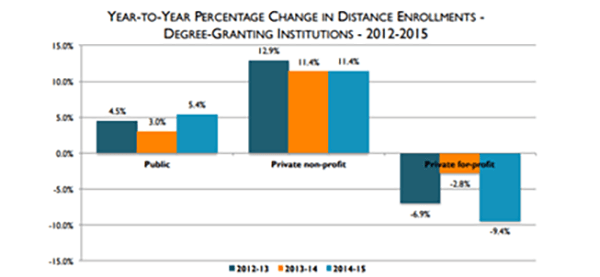As the on-campus student population continues to shrink, more students overall are choosing to go to school online … but only at certain types of schools.
Between 2012 and 2015, two thirds of distance education providers grew enrollments. Private and public non-profit schools – such as brick and mortar schools that now offer online degree courses – led the way by growing 68 percent and 63.9 percent, respectively. However, as the chart shows, the for-profit school sector granting degrees lost students each year during the same timeframe.

Data Source: Inside Higher Education
The decline at for-profit schools comes from two theories. One, public and private non-profit schools took more time to ramp up their online offerings, so they didn’t have their online courses ready until the start of this timeframe; as a result, they grew more quickly in their online offerings. Now many of the schools have integrated their online curriculum with their on-campus programs, making them almost a seamless system.
The second theory thinks for-profit schools jumped into the fray right away unprepared and tried to capitalize on the demand too fast. Their programs were not set-up as good and some schools did not even have any type of accreditation, thus making their degrees worthless. We saw that was the case with many students who were attending ITT Technical and Corinthian College when they closed their doors. Most other schools would not accept transfer-in credits from these for-profit schools.
Forever GI Bill
For veterans attending these schools on the GI Bill, they spent part or most of their 36 months of entitlement, but because there wasn’t a safety net in place for them to recoup it due to school closure, they were just out and had to start over at a different school. One feature of the “Forever GI Bill,” awaiting the president’s signature will retroactively restore GI Bill entitlement for these veterans.
Online degrees vs online degree training
The latest for-profit school to come under fire is Ashford University, part of Bridgepoint Education. Iowa’s State Approving Authority pulled Ashford’s GI Bill eligibility for online courses last year after Ashford closed their campus in Clinton, Iowa in 2015.
This week the Iowa District Court dismissed a petition from Ashford that if approved would have allowed them to continue offering online programs to GI Bill students. Since then, Ashford has reported it had received approval from Arizona to offer online courses to GI Bill students in that state.
If the current trend continues, analysts think that as private and public non-profit schools continue to mature their online programs, enrollment will continue to decline at for-profit online schools. In an effort to “stop the bleeding”, many of the for-profit schools are morphing themselves from being degree-granting to more career oriented as a way of distancing themselves from non-profit degree-granting schools, in hope of bolstering enrollment.




